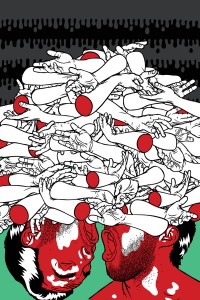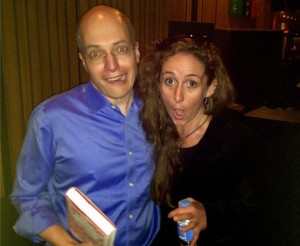Working in theatre: Sometimes it sucks
- April 13th, 2012
- Posted in Commentary
- Write comment
![vacuum-cleaner-diagram[1] vacuum-cleaner-diagram[1]](../../../wp-content/uploads/2012/04/vacuum-cleaner-diagram1-234x300.jpg)
I’ve been knee-deep in applications: grants, residencies, fellowships. It takes up a lot of time. It is around this time when I start to become extremely disappointed that I didn’t choose medicine or being a librarian or a florist. But I work in the theatre.
We are in an age of digital capture. Our attention is captured. Moments of our friendship and lives are captured: forever documented in non-tangible space. We spend time connecting over screens: computer, phone, TV, cinema. The antithesis of this is theatre: a live, transient experience.
And so, for the theatre worker what we are left with is some photos, maybe some reviews, a ticket stubb, a postcard? And our work becomes one of many moments listed on our CV, moments which means absolutely nothing to anyone but yourself – and maybe a handful of people. I think this is why the writing of your “bio” in applications or for programs is so hated by so many artists – not only does it feel like big-noting (an unAustralian pass time) but it forces you to confront the work you’ve made. For the theatre worker, the list of work, your CV carries a lot of baggage: artistic immaturity, emotional energy and fraught or
legitimized relationships.
Ah legitimization. It’s tough. How do you know when you are emerging, professional or what? Since there are very few “full time artist” positions in the world – what makes you a fully fledged and professional artist?
In one application for Parramatta Council there is a very interesting section:
DEFINITION OF PROFESSIONAL ARTIST
· The definition of ‘professional artist’ is deliberately broad to take into account factors such as: artists from diverse cultural backgrounds whose artistic or cultural knowledge has been developed through oral traditions
· professional artists who are self-taught
· artists of professional calibre who must work outside the arts to generate income.
· they identify as such on the basis of skill or experience
· accepted by peers or the arts industry as a professional and may or may not earn income from
their artwork.
Recently I read an article on artshub with the titled “What is an emerging artist?” http://www.artshub.com.au/au/news-article/opinions/arts/what-is-an-emerging-artist-188491?sc=1 which confirmed my long term belief – that we should drop the word “emerging” and “established” as prefixes to the word “artist.” After all – it is all the same process: the struggles of making merely change with the more experience you have.
The internal monologue of artists never really changes does it? We ask ourselves, what are we doing, why are we doing it, how are we doing it, for whom are we doing it? And as we age we ask, why are we still doing this? Why isn’t this easier? Why aren’t I a millionaire? Why didn’t I become a florist? It’s one of the reasons I have always loved Tim Andrew’s painting called “Where’s My Private Jet?”

Where's My Private Jet?
It speaks of a time or a realisation that despite the masses of work, of time, of money, of energy spent, you are not John Travolta. And you don’t have a private jet, so what is it all coming to? What is it for?
Another great observation on the hello of being a playwright comes from one of my favourites: Patrick Lenton – who asks why theatre and not a more lucrative money-making pursuit.
http://spontaneityreview.blogspot.com.au/2012/03/theatre.html
I spent a good section of my easter break writing applications, baking bread and watching, reading and listening to all I could about the history of the castrati in Italy. What fascinates me about the world of the castrati -the motivation/justification/ physcial castration itself, the music and the society of the time -is the idea of extreme sacrifice for the sake of art.
Art, art making and being an artist is a gamble.
Writing grants and applications is a wearisome full time job – which is unpaid and unmonitored and offers no guarantee. And after a while – after being removed from what you actually want or shoudl be doing as an artist (ie making art) and instead writing by yourself about possible hypothetical projects it is easy to lose all confidence and doubt everything.
I often liken it to this scene in The Never Ending Story:
I have been making work for over ten years. Not all of it as a professional, not all of it in the country, some of it self funded. I have been going from project to project without the assistance of government funding, without financial assistance from my family. I have worked full time jobs to susbidize my theatre work. I have provided prodcution and development opportunities for over 500 artists in the last five years. I am currently working on projects with a total of 19 different playwrights across 13 different projects – I’m busy, I’m happy and I am honoured to keep the creative company of so many astounding artists and writers.
I sometimes wake up and think – how did I go from being a child genius to an artist who feel so illegitimate? How is it that I have pages upon pages of theatre credits and yet no job security? Is taking time off from my day job to write grants and applications is really worth it? Where is my private jet?
But I suspect that these petty, boring questions are pretty common… and really only worth worrying about for 20 minutes a week – surely I’ve got better things to do, than worry about my status and legitimacy and the gamble of applications.
Sometimes working in theatre sucks.
And so I’m writing this to remind myself to suck it up.
SUCK IT ALL UP.
Inhale. Soak it up, suck it up, drag it all in. Embrace the fear. Face the rejection. Put your ego and your doubt to one side. Unclutter your expectation. And just focus on the work.
And if it’s making you sad, Gus, just look at this photo of when you asked Alain de Botton to pull a crazy face … it will make you happy.

Yes. Just Yes.
Also I was wondering how Alain de Botton was going to figure in… 😛
Thanks Teegan, always great to see your name pop up!
Alain de Botton writes about status anxiety – which I think is something that theatre artists deal with more than most people – due to the fickle, poorly paid and transient work we make.
That photo is pretty fun.
It reminds me that even super star philosophers love to be directed by me… and have a fun side… and don’t take themselves too seriously – nor should any of us. Plus de Botton talks extensively about the value of arts in a secular society as works of emotional elevation and consolation (mood enhancers).